After WeHo-L.A. split, many expected 'Pride wars.' Instead, it's a fight for survival
Roy Cortez arrived at the West Hollywood Pride festival last weekend in full Sunday best: a plaid miniskirt that showed off a bit of underbutt and a bleached crew cut with intricately dyed designs.
All around Cortez, crowds from the street fair on Santa Monica Boulevard trickled into West Hollywood Park, where Carly Rae Jepsen headlined the final night of the ticketed Outloud festival.
But the 27-year-old Cortez couldn’t shake a feeling that the party felt complicated this year.
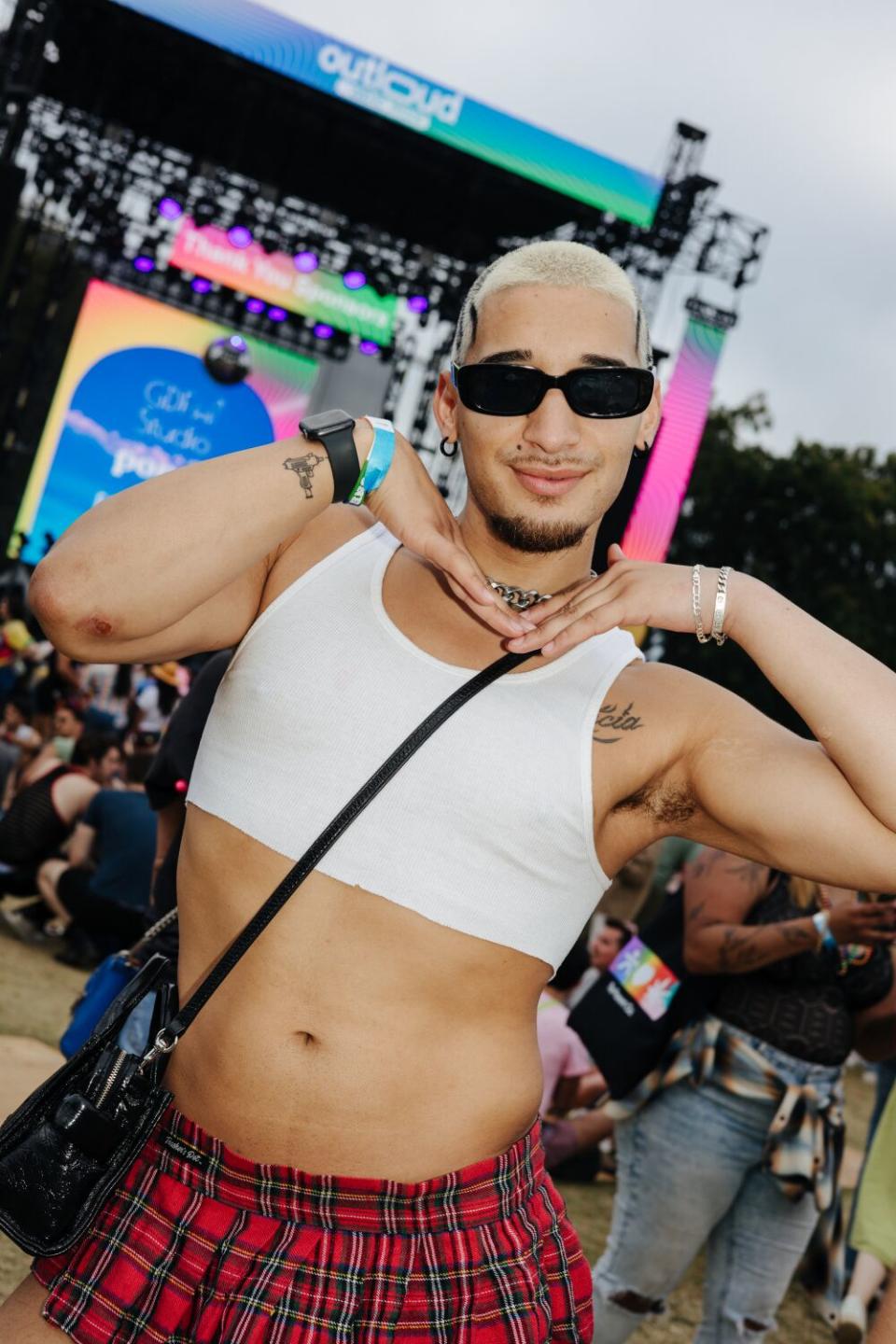
“I live for this, and I’m happy to be back in my community around all the girls,” Cortez said, gesturing to the surrounding crew of gays and theys. “But honestly, it's just different now because of the way that they charge everybody. Before COVID, it was cheaper. Now I feel like it’s more corporate.”
The inchoate feeling that Pride isn't as provocative as it once was probably set in as soon as they swept up the glass from Stonewall. This year, in L.A., the meaning of the occasion — an unapologetic celebration of queer community, life and values — is as contested as ever.
After a tense 2020 split between the city of West Hollywood, long the epicenter of queer life in SoCal, and Christopher Street West, the organizers of the L.A. Pride celebration, the city now has two competing Pride festivals just a week apart (L.A. Pride took place this weekend at L.A. State Historic Park in Chinatown).
Although both Prides have free, community-driven parades and street fairs that draw tens of thousands, they have also become home to marquee concerts, booking globally prominent acts like Mariah Carey and Megan Thee Stallion for L.A. Pride and Jepsen and Grace Jones for West Hollywood, with tickets running into the hundreds of dollars. Some in L.A.’s LGBTQ+ community have wondered whether L.A.’s two Prides now represent different constituencies, or have ambitions to become regional music festivals.
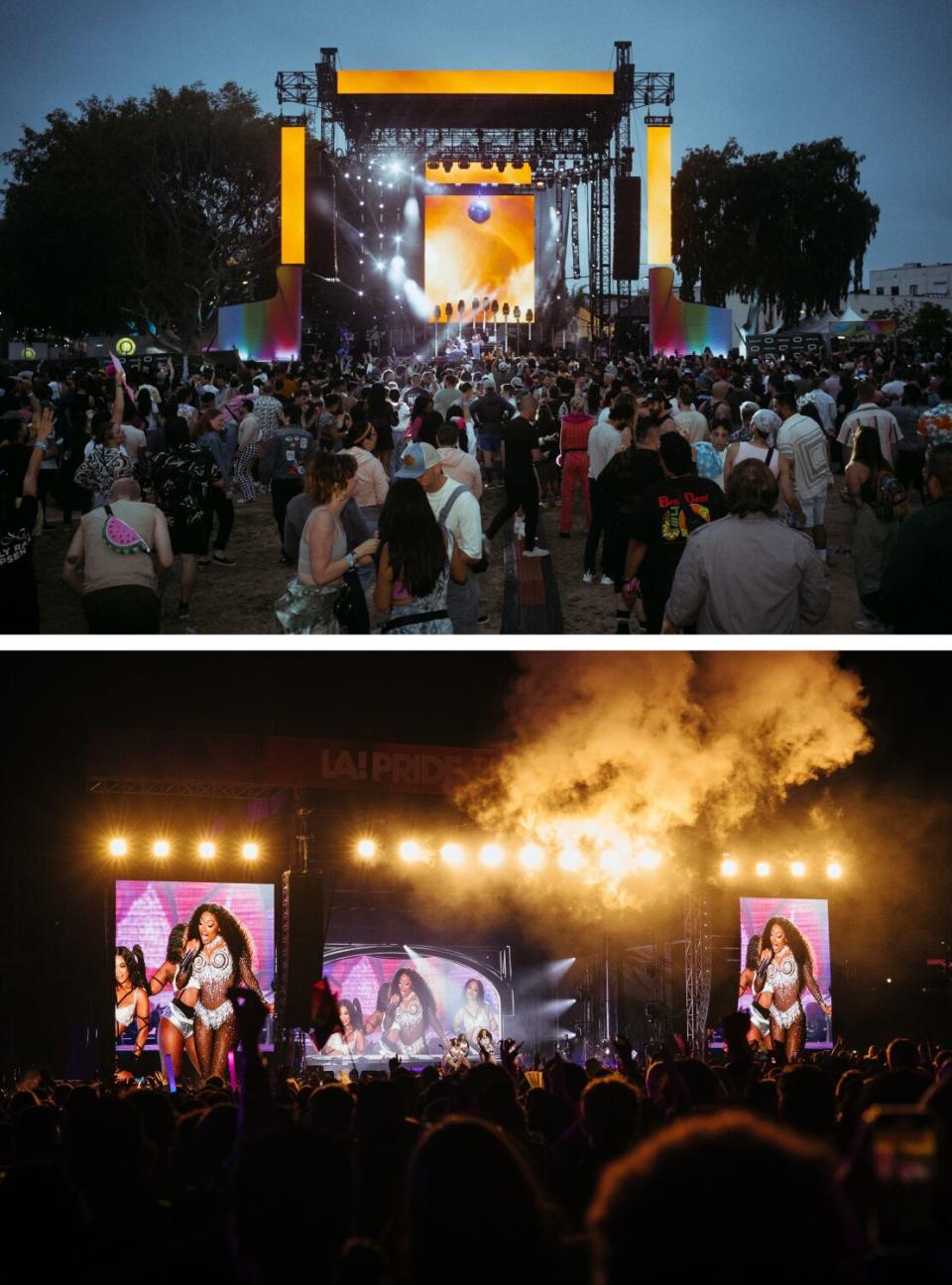
The 2020 All Black Lives Matter march led many to reassess Pride’s racial and gender inclusiveness. Meanwhile, a brutal slate of anti-LGBTQ+ laws has passed around the country. As a result, Pride is once again under fire from opponents without, and prompting debate from supporters within whether its proper form is a party, a protest or both.
A clash over a North Hollywood elementary school's Pride events and violence outside a Glendale school board meeting show those conflicts have arrived in L.A. On Friday, beneath an overpass on the southbound 101 heading toward downtown, someone had sprayed a giant message in blue graffiti: "F— Pride Month."
Even the corporations behind products such as Bud Light, a source of both grumbles and funding for LGBTQ+ activists, are backing away from national advocacy while sponsoring events on gay-friendly turf.
Whether or not L.A.’s Pride fans feel any tension, it’s clear that the character and purpose of the celebrations are shifting.
“Seeing some of the backlash that’s happened recently, it's affirming to hear people remember that Pride is not about corporate sponsorship,” said Nicholas Angeloni, 29, who traveled to West Hollywood from Las Vegas. “It’s about throwing bricks.”
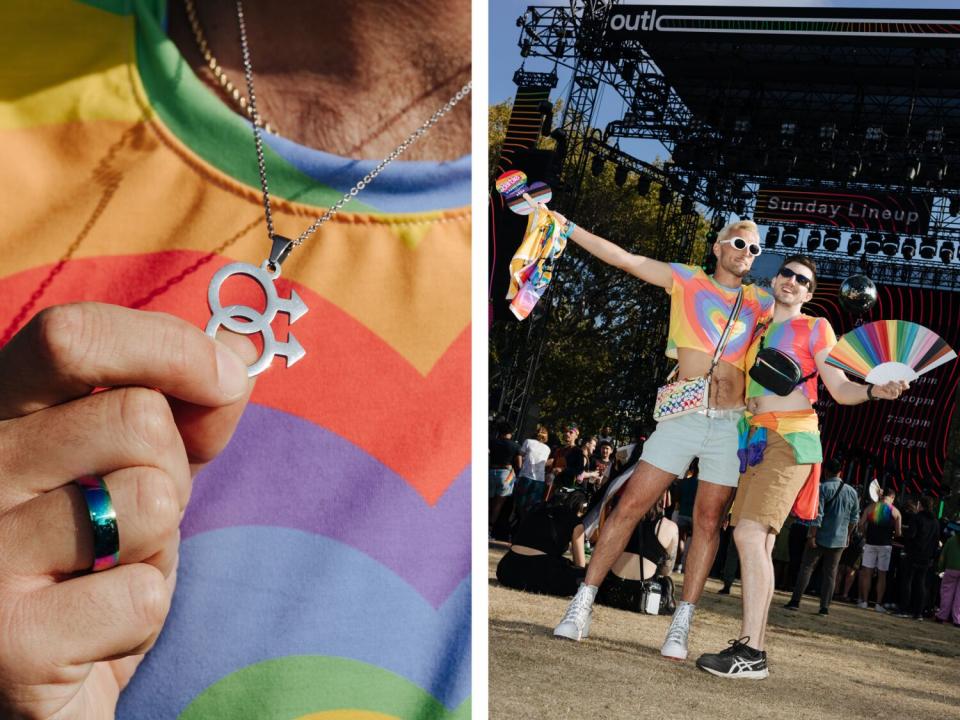
Organizers of WeHo and L.A. Pride events stressed that whatever the history between them, they do not see a conflict. Jeff Consoletti, who used to work with L.A. Pride and founded the live event and entertainment agency JJLA, which produced the Outloud festival for WeHo Pride, lamented that “people wanted there to be these Pride wars. For me, the more Pride, the merrier. Like, when’s Weekend 3?”
He’s well aware that within the queer community, West Hollywood “sometimes gets this bad rap that it's not diverse. But I've seen a really changed community where there's a lot of variety in race, wealth and age. Specific to West Hollywood, queer identity feels much more diverse, when before it felt like it was more of a place for white gay men.”
L.A. Pride board member Vanessa Cervantes, 23, also acknowledged the importance of representing the full array of LGBTQ+ people at Pride. .
"We try to make this more inclusive for not just gay folks but specifically Black folks and trans folks," Cervantes said. "It's important to recognize that if we don’t have each other, who do we have? We live in a world that doesn’t accept people like us."
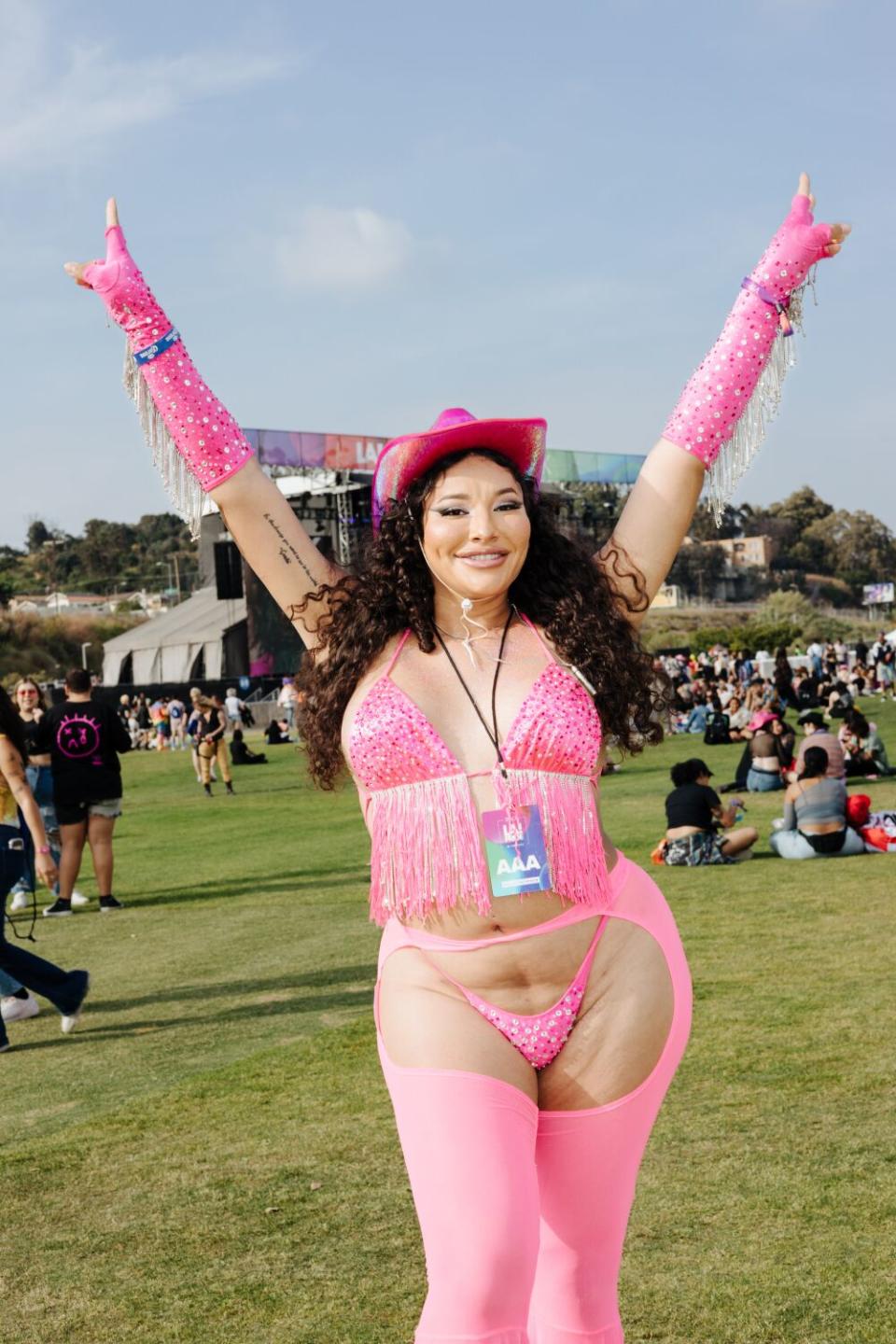
Out in the jubilant crowds, some wondered how L.A.’s Pride celebrations would reflect the city’s changing queer communities.
Gracie McKesson, 24, was celebrating Pride in WeHo for the first time, after a strict upbringing and three years of the pandemic. "It’s definitely a personal milestone," McKesson said. "The last couple of years have been very isolated, and to be able to sit on a field of grass and see music is really special.”
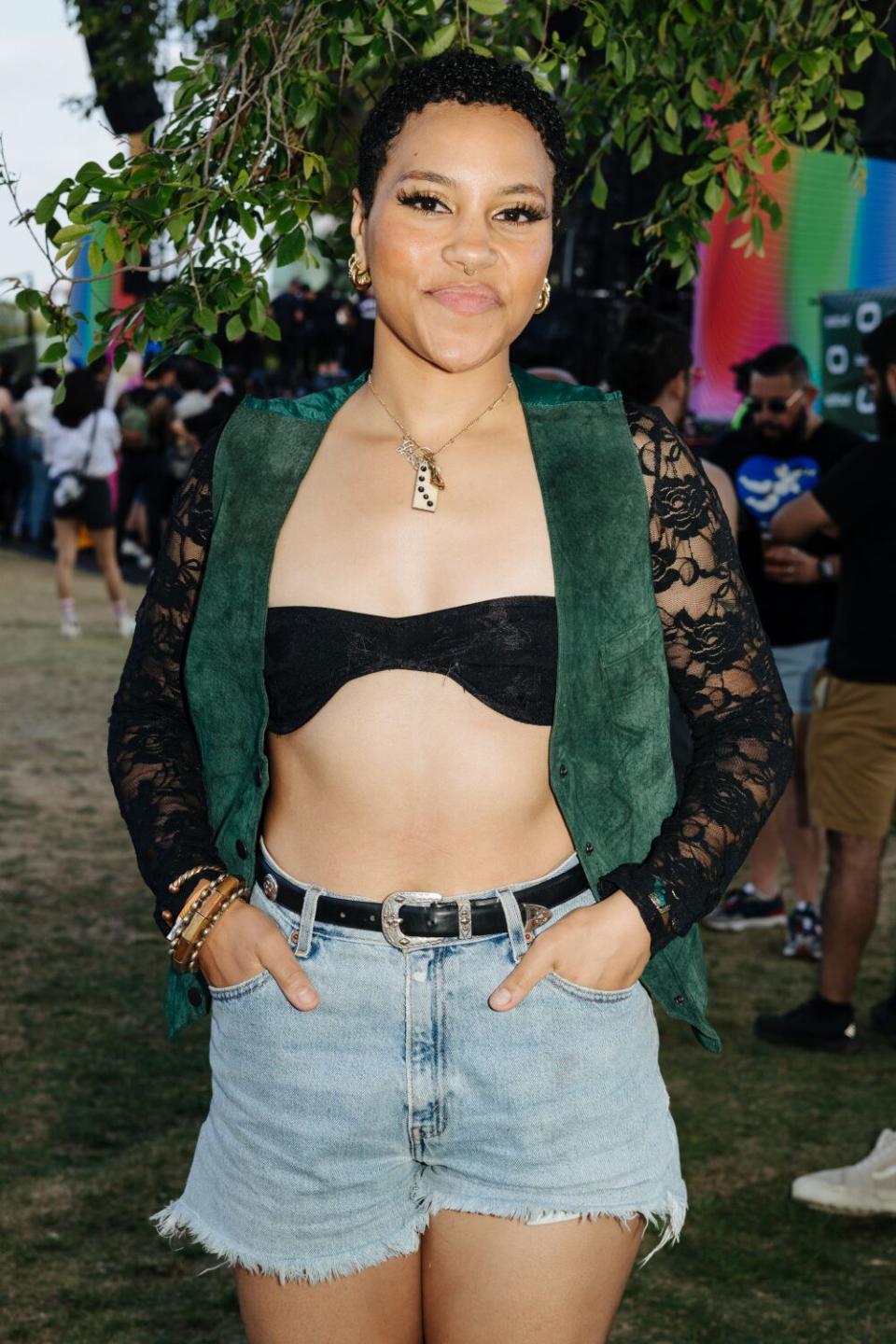
Yet McKesson also noticed that “these spaces tend to be white focused, or look a certain way. There’s a lot of white gay male faces. But I definitely feel it opening up too. I just hope one day there's broad acceptance of however you identify gender-wise or in your sexual orientation. We’ve still got a long way to go.”
Consoletti, for his part, said that when booking WeHo Pride, he saw Black acts like Jones and the pop-punk group Meet Me at the Altar as exemplars of the kind of celebration he wanted. “At a queer show that's tied to Pride, every faction of our community should be represented,” he said. “Underserved talent or communities should be on the stage just as much as another cis, white, gay man.”
The 2020 All Black Lives Matter march was a welcome new emphasis, said Sergio Garrido-Ramirez, 31. “I think the conversation around Black trans women and Black lives has gone away some, but it should never stop. We wouldn't have a Pride if it wasn't for Black trans women. Go back to the history books.”
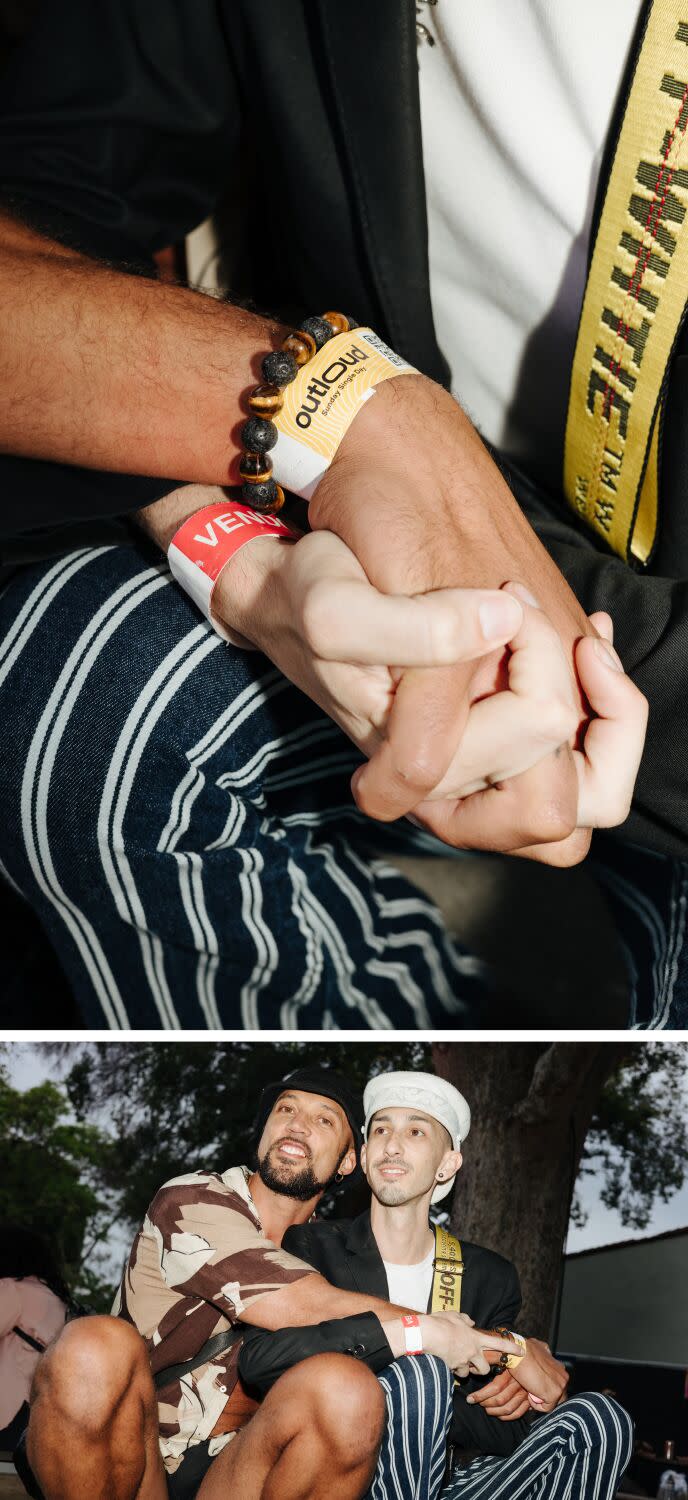
“When you look back and you consider how hard people had to fight for civil rights, I think it can inspire a tenacity within us to reorient to the good struggle,” added Rocky Heron, 36, cuddling Garrido-Ramirez on the lawn. “It’s not finished.”
For trans women like Donna Dean Miller, 51 and a singer with the Trans Chorus of Los Angeles, it’s a bitter irony that just as the gay community makes more efforts towards inclusion, much of the country is backsliding. Even something as mockable as Bud Light’s retreat from its collaboration with trans influencer Dylan Mulvaney feels like a harbinger. (However, Bud Light was still a prominent sponsor of WeHo Pride).
“It feels like a new world where things are fundamentally changing,” Miller said. “A lot of people are afraid to speak up. We need the silent majority of Americans who support gay rights, transgender rights, to say that you don't think it's so bad that people are who they are and love who they love.”
Scottie Jeanette Madden, 60, also with the Trans Chorus, added that, for all the festivities, “Pride’s not Gay Coachella. Compton's Cafeteria was a two week s— show. [Pre-Stonewall riots at] Cooper Do-nuts and the Black Cat here in Los Angeles ignited the entire thing, and people said, ‘I'm gonna go out and add my voice to it.' That's how the world changes.”
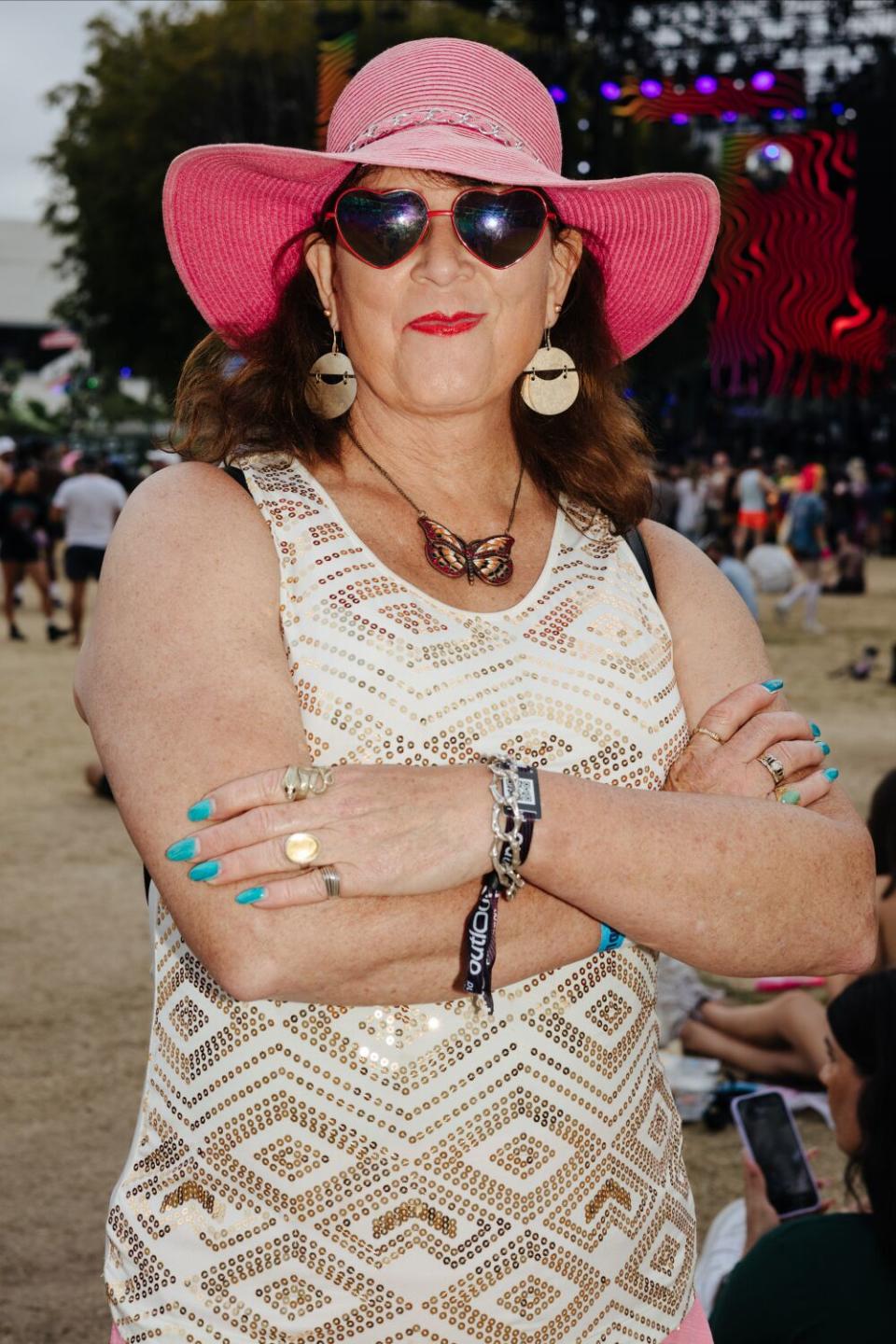
Damon Rodefer, 24, flew in from Nashville for L.A. Pride after several years of pandemic-thwarted plans. He wore a rainbow shirt that happily reclaimed an anti-gay slur, one he definitely wouldn't have donned for a night out at home.
"Oh, my God. It's a breath of fresh air to be here. I want to move here and get the hell out of Tennessee," Rodefer said. That state's limits on drag show performances, recently ruled unconstitutional by a federal judge, underlined how hard-fought events such as these are, even when they're just about cutting loose.
"I think both aspects are important. We need seriousness to get s— done, but also a time to have fun and be silly," Rodefer said.
"In the South, they're banning drag to 'protect children' but won't do anything about guns," said his friend Virginia Hart Houma, 23. "Here, you don't have to be afraid of anything violent or bad happening."
Although the local school fights showed that's not completely true, several partygoers were happy to see a younger generation out in public amid a creeping fear of regression.
"It's inspiring to other generations who aren't that confident with sexuality, to see people comfortable living their best lives," said Alexis Gonzalez, 27.
"This does feel like the first time a lot of people could come together and be their whole selves," said Flo Oliveira, 24, who came up from San Diego. Yet Oliveira was well aware of the resurgent tensions around LGBTQ+ culture: "Black trans people have had to fight all the time for spaces like this, and we need to do the same."
Some fans thought the formidable headliners at this year's Pride concerts were a vote of confidence for queer culture.
Chris Veras, 24, is a longtime fan of Megan Thee Stallion, and to see her headline L.A. Pride meant a lot. "We're surrounded by this war of hatred for no reason, and to see her support this occasion speaks volumes," Veras said.
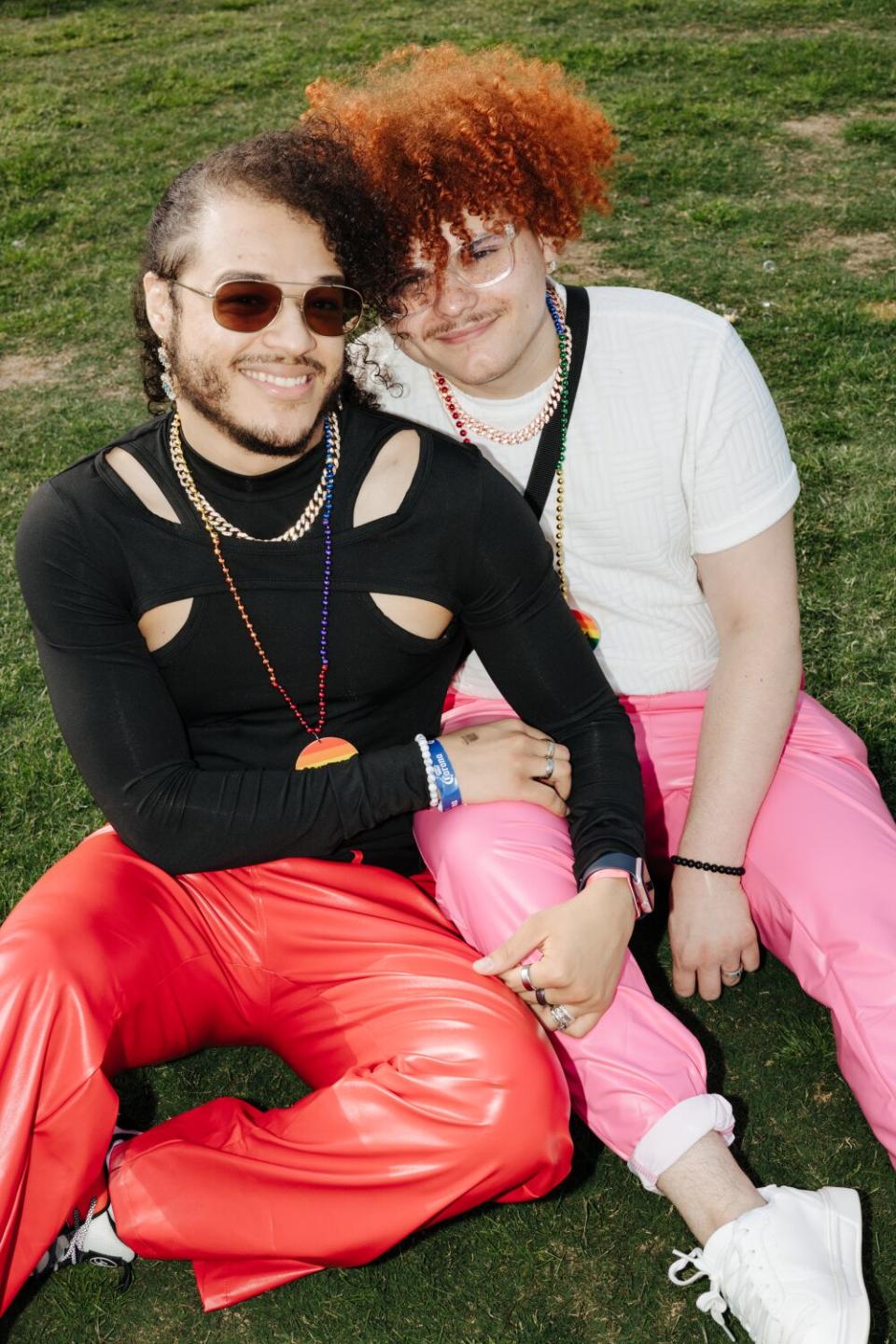
This was Veras' first time at a Pride event, and he was happy to see the range of body types on display. "We have these Eurocentric beauty standards, where if you're not a fit white man you're not desirable," Veras said. "Even me in this outfit, I'm out in my own skin. Years ago, it would have been important to me to see someone who looks like me at Pride and be able to say, 'That looks like someone I know.'"
The push for a diversity of and at Pride events was one upside of the split between WeHo and L.A., Madden said at the West Hollywood show. She's on the board of DTLA Proud as well, and she hopes this year marks the flowering of more such events around the region.
"The problem with having one Pride for each metropolitan area is that many in our community are discriminated against, and they don't have jobs. They don't have housing, so they can't afford to go many bus stops away," Madden said. "So they need to have one in their own neighborhood. People in Whittier need to know that there are gay people in Whittier. That we're living right next door to you, we run the store, we deliver the mail to you."
Still, that Pride is a celebration of a community once forced into hiding, and could be again, was on the minds of many this year. On June 4, at a table toward the back of WeHo Pride, Addy Benavides, 31, and Vlad Rabcheniuk, 24, nuzzled between DJ sets.
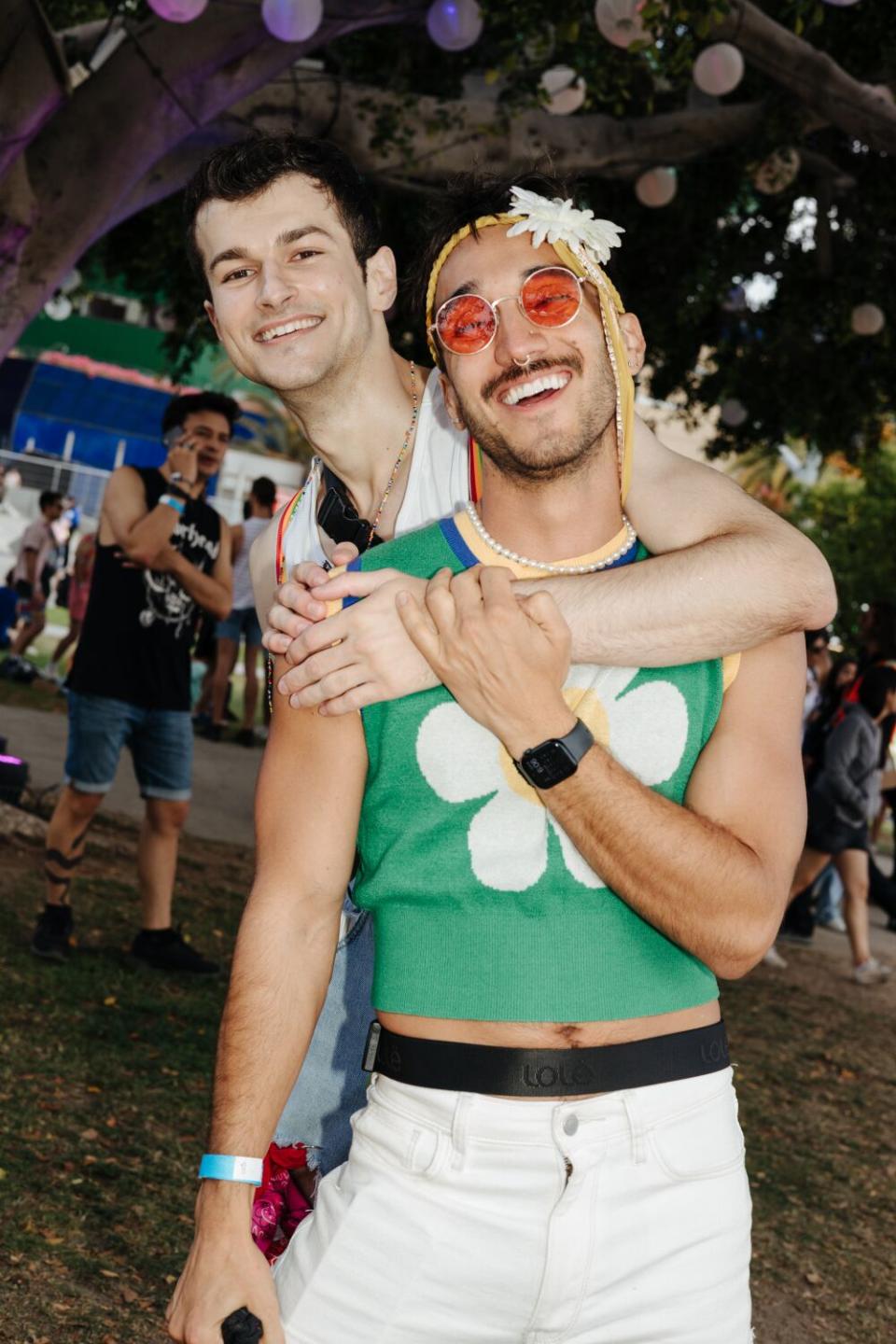
“We met yesterday,” Benavides said, doe-eyed. “If we cut things like this out, and we make laws that keep drag queens out of libraries, this will just happen underground. We're always going to party. We're always going to make love, and we're always going to find each other, but we want the people who are not like us to be in our lives too.”
Rabcheniuk moved to L.A. from Ukraine a few years ago and knows exactly how precious and tenuous any Pride celebration like this is.
“I think it's so important that Pride is happening in this country, because it gives an example to other countries that don't have such,” Rabcheniuk said. “Some people take it for granted. But for some people, even if they’re just seeing a picture of this on their computer because they don't have it in real life, it's important for them to have a picture of themselves.”
This story originally appeared in Los Angeles Times.

